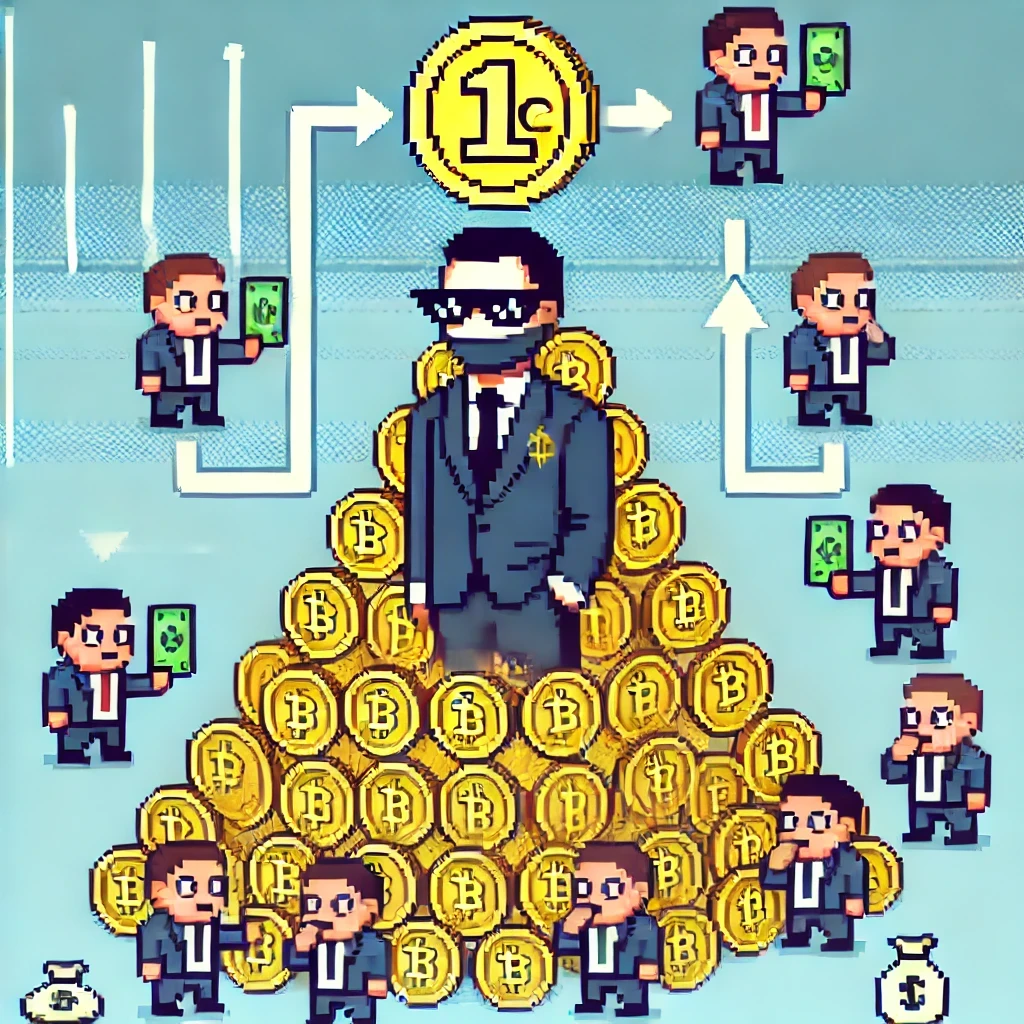
Introduction: The arrest of Pavel Durov
In August 2024, Telegram founder Pavel Durov was arrested in Paris, an event that attracted widespread attention and discussion in the cryptocurrency community. Durovs arrest not only had a direct negative impact on the Toncoin project, causing its market performance to plummet, with both prices and trading volumes falling sharply, but also highlighted the legal and regulatory risks in the cryptocurrency field. Toncoin is a cryptocurrency project developed based on the Telegram Open Network (TON), which aims to provide a high-speed, secure and scalable blockchain network. However, Durovs arrest, on suspicion of involvement in illegal transactions and possession and distribution of child pornography, casts a shadow on the future of this project.
After the news of Durovs arrest, the Kremlin quickly stated that it was not aware of the meeting between Russian President Putin and Durov, and did not comment on the arrest of defense officials who were close to former Defense Minister Shoigu. At the same time, TON Society launched a campaign calling on French authorities to release Durov, which has received more than 4 million signatures, showing the communitys support for Durov. In addition, Russia also warned the French government not to take political action in Durovs case, which further complicated the incident.
Durov faces six charges, including assisting in the management of an illegal trading platform, refusing to provide information required for judicial surveillance, participating in the production and dissemination of programs for attacking data systems and child pornography. Durov is also under investigation in Switzerland for a criminal complaint filed by his ex-partner Irina Bolgar, alleging child abuse. These allegations surfaced after Durovs recent arrest in France and are part of a wider legal dispute.
As uncertainty in the Toncoin market increases, investors are beginning to seek other cryptocurrencies as a safe haven. Ethereum has become the first choice for investors with its revolutionary smart contract function and wide application in multiple fields. The price of Ethereum has risen by more than 62.66% in the past year and has remained relatively stable amid market fluctuations. On the other hand, the emerging blockchain project Rollblock has also attracted the attention of investors. It ensures the transparency and fairness of online games through blockchain technology, providing investors with a safe and reliable long-term investment option.
1. The Sam Bankman-Fried debacle
In November 2022, a shocking event occurred in the cryptocurrency field: Sam Bankman-Fried (SBF), the founder of FTX exchange, was arrested in the Bahamas. FTX was once one of the worlds largest cryptocurrency trading platforms, known for its excellent liquidity and diversified financial products. However, as a series of shocking allegations surfaced, SBFs financial empire collapsed.
The incident was triggered by a report released by CoinDesk, which revealed that FTXs sister company Alameda Research held a large number of FTT tokens issued by FTX, triggering market concerns about FTXs liquidity. Then, FTX filed for bankruptcy protection within a month, and the new CEO John J. Ray III revealed the chaos and governance failures within FTX in court documents and congressional testimony, pointing out that the company had serious problems with the mixing of customer and corporate assets, resulting in billions of dollars in losses.
SBF’s arrest is a direct result of a series of criminal charges brought against him by U.S. authorities. He is charged with wire fraud, securities fraud, money laundering, and related conspiracy charges. The SEC also plans to bring charges against him for securities violations. The Bahamas has stated that they intend to expeditiously process the extradition request in accordance with Bahamian law and treaty obligations with the United States.
This incident not only dealt a devastating blow to SBF personally, but also had a profound impact on the entire cryptocurrency market. Investors’ confidence in cryptocurrency exchanges has been severely hit, and the market’s demand for regulation of the cryptocurrency industry has become more urgent. SBF’s case has become a typical example of the lack of regulation and risk management in the cryptocurrency industry, triggering a global re-examination of the operating model of cryptocurrency exchanges.

2. Changpeng Zhao’s Challenge
Binance founder Zhao Changpeng went through an important sentencing hearing on May 1, 2024. The hearing was because he pleaded guilty in the United States for violating the Bank Secrecy Act and reached a $4.3 billion settlement with the authorities. Although the US Department of Justice initially recommended a 36-month prison sentence, Judge Richard Jones ultimately decided to sentence Zhao Changpeng to 4 months in prison. This sentence took into account his cooperative attitude and letters of support from all walks of life.
This incident has had a significant impact on Binances global operations and reputation, and has also prompted other exchanges to strengthen their compliance standards. Zhao Changpeng said after the hearing that he would use this time to reflect on his actions and plan for future developments, especially in the field of education. This not only shows his positive attitude towards the future, but also creates a responsible image for him in front of the public.
Although Zhao Changpeng has shown a willingness to repent, his case still brought a great impact to Binance. As one of the worlds largest cryptocurrency exchanges, Binance has to review its compliance policies and take stricter measures to ensure the legality of its business. This incident also sounded the alarm for the entire cryptocurrency industry, reminding all practitioners to abide by the law and assume corresponding social responsibilities.
Zhao Changpengs experience is not only a test for him personally, but also a warning to the entire cryptocurrency industry. As global regulation of cryptocurrency continues to strengthen, his case will become an important case for future discussion, pushing the industry towards a more compliant and healthier direction.

3. Alex Mashinsky’s Dilemma
Alex Mashinsky is the former CEO of Celsius Network, a decentralized financial platform that provides cryptocurrency lending and yield services. In 2023, Mashinsky was arrested for allegedly misleading investors and defrauding users of billions of dollars, an incident that caused a huge stir in the cryptocurrency space.
Celsius Network was once a leader in the cryptocurrency lending market, attracting a large number of users to borrow and invest in cryptocurrencies through its platform. However, with the news of Mashinskys arrest, Celsius Networks operations were severely affected and users trust in the platform dropped sharply. This incident not only dealt a direct blow to Celsius Network, but also triggered a deep reflection on security and compliance in the entire decentralized finance (DeFi) field.
Mashinsky’s arrest was related to his misconduct in the operation of Celsius Network, including misleading investors and defrauding users, which ultimately led to billions of dollars in losses. This incident highlights the lack of supervision and inadequate risk management in the rapid development of the cryptocurrency industry.
As the incident unfolded, Celsius Network users began to worry about the safety of their funds and the security of other DeFi platforms. The incident prompted regulators and industry participants to re-examine the risks in the DeFi field and seek measures to strengthen supervision and increase transparency. In the long run, Mashinskys arrest may push the cryptocurrency industry in a more standardized and secure direction, although it may have a certain impact on market confidence in the short term.

4. Do Kwons Escape
Do Kwon is the founder of the Terra/Luna blockchain platform, which aims to provide stable cryptocurrency solutions through algorithmic stablecoins. However, in March 2023, he was arrested in Montenegro on suspicion of using forged travel documents, an incident that attracted global attention.
Du Kuan’s arrest marks the end of his life on the run, after he traveled across Asia and Europe trying to evade authorities following the collapse of the $40 billion cryptocurrency LUNA. The collapse of LUNA and its algorithmic stablecoin TerraUSD led to billions of dollars in investor losses in one of the biggest disasters in cryptocurrency history. U.S. and South Korean authorities have launched an investigation into Du Kuan, accusing him of causing significant losses to investors by issuing false and misleading statements.
After his arrest, Du Kuan faces extradition requests from South Korea and the United States, and prosecutors believe he could face severe penalties for financial crimes. This incident was not only a devastating blow to Du Kuan personally, but also had a serious impact on the Terra/Luna community, with many investors losing confidence in the platform. More broadly, this incident has raised questions about the feasibility of algorithmic stablecoins and prompted in-depth reflection on the regulation and compliance of cryptocurrencies within and outside the industry.
Du Kuan’s escape and subsequent arrest revealed the potential risks and uncertainties in the cryptocurrency industry, prompting investors and regulators to re-examine the future of this emerging field.

5. OneCoin scam
Karl Sebastian Greenwood and Ruja Ignatova are co-founders of the OneCoin project, a fake multi-level cryptocurrency scheme widely known as a “crypto Ponzi scheme”. OneCoin lured investors worldwide into investing huge sums of money through false statements and misleading marketing.
Greenwood was arrested in 2023, while Ignatova remains at large. Greenwood was sentenced by the U.S. Attorney’s Office for the Southern District of New York to 20 years in prison and ordered to pay approximately $300 million in forfeiture. He was charged with conspiracy to commit wire fraud and conspiracy to launder money, crimes that resulted in millions of victims and billions of dollars in losses.
Ignatova was offered a $5 million reward by the U.S. State Department for clues leading to her location, and she was placed on the FBIs most wanted list in 2022. The High Court in London also issued a global asset freezing order, freezing the assets of people involved in the OneCoin fraud, including Ignatovas related assets.
The exposure of this Ponzi scheme has had a profound impact on global cryptocurrency regulation and investor protection policies. It has reminded regulators and investors to be vigilant against fraud in the emerging fintech sector and has emphasized the need for strict scrutiny and regulation of cryptocurrency projects. The OneCoin case has become a landmark event in the global fight against financial crime and the strengthening of international cooperation to track and punish fraudsters.

Conclusion and Analysis
In the world of cryptocurrencies, regulation plays a vital role. As cryptocurrencies gradually become part of the financial system, the risks and complexities they bring are becoming increasingly prominent, which requires appropriate regulation to protect investors, maintain market stability, and prevent illegal activities such as money laundering and financing of terrorism.
The challenge facing regulators is how to formulate rules that can protect investors and maintain market vitality without inhibiting innovation. At the same time, regulators must also deal with the challenges posed by the global nature of cryptocurrencies. The differences in regulatory policies between different countries and regions have made it difficult to achieve unified global regulation. Regulation must not only keep up with rapidly changing technology, but also be effectively coordinated internationally to avoid regulatory arbitrage.
In addition, regulatory actions often reflect conflicts of interest and geopolitical struggles between countries. For example, the US actions against Binance and Zhao Changpeng are not only aimed at maintaining the stability of the financial market, but also at weakening Chinas influence in the global cryptocurrency market. Similarly, the Do Kwon and Terra/Luna incidents have also triggered judicial cooperation and extradition disputes between South Korea and the United States.
These events show that regulation in the cryptocurrency field is not only a technical and legal issue, but also part of the political game between countries. Countries may use regulatory means to advance their own interests and strengthen their influence in the global cryptocurrency market. In this process, technological sovereignty has become a new focus of competition between countries.
In general, regulation in the cryptocurrency sector is a complex issue that involves not only technological innovation and market stability, but also international cooperation and political struggles. Regulators need to constantly adapt to market changes and balance the interests of all parties to promote the healthy development of the cryptocurrency sector. At the same time, the international community also needs to strengthen cooperation to jointly address the global challenges brought about by cryptocurrencies.










